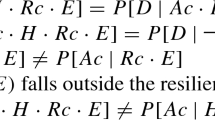Abstract
Even if our justified beliefs are closed under known entailment, there may still be instances of transmission failure. Transmission failure occurs when P entails Q, but a subject cannot acquire a justified belief that Q by deducing it from P. Paradigm cases of transmission failure involve inferences from mundane beliefs (e.g., that the wall in front of you is red) to the denials of skeptical hypotheses relative to those beliefs (e.g., that the wall in front of you is not white and lit by red lights). According to the Bayesian explanation, transmission failure occurs when (i) the subject’s belief that P is based on E, and (ii) P(Q|E) < P(Q). But there are compelling cases of transmission failure where P(Q|E) > P(Q). No modifications of the Bayesian explanation are capable of accommodating such cases, so the explanation must be rejected as inadequate. Alternative explanations employing simple subjunctive conditionals are fully capable of capturing all of the paradigm cases, as well as those missed by the Bayesian explanation.
Similar content being viewed by others
References
Brown J. (2004) Wright on transmission failure. Analysis 64(1): 57–67
Chandler J. (2010) The transmission of support: A Bayesian re-analysis. Synthese 176(3): 333–343
Cohen S. (2002) Basic knowledge and the problem of easy knowledge. Philosophy and Phenomenological Research 65(2): 309–329
Cohen S. (2005) Why basic knowledge is easy knowledge. Philosophy and Phenomenological Research 70(2): 417–430
Davies M. (2003) Externalism, self-knowledge, and transmission of warrant. In: Frápolli M., Romero E. (eds) Meaning, basic self-knowledge, and mind: Essays on Tyler Burge. CSLI Publications, Stanford, pp 105–130
Davies M. (2004) Epistemic entitlement, warrant transmission, and easy knowledge. Aristotelian Society Supplement 78: 213–245
DeRose K. (1994) Lewis on ‘might’ and ‘would’ counterfactuals. Canadian Journal of Philosophy 24: 413–418
Dretske F. I. (1970) Epistemic operators. The Journal of Philosophy 67(24): 1007–1023
Hawthorne, J. (2004) The case for closure. In M. Steup, (Ed.), Contemporary Debates is Epistemology. Blackwell.
Lewis D. (1973) Counterfactuals. Blackwell Publishing, Oxford
Neta R. (2007) Fixing the transmission: The new Mooreans. In: Nuccetelli S., Seay G. (eds) Themes from G. E. Moore: New essays in epistemology and ethics. Oxford University Press, Oxford
Okasha S. (2004) Wright on the transmission of support: A Bayesian analysis. Analysis 64(2): 139–146
Pollock J. (1974) Knowledge and justification. Princeton University Press, Princeton, NJ
Pryor J. (2004) What’s wrong with Moore’s argument?. Philosophical Issues 14(1): 349–378
Pryor J. (2009) When warrant transmits. In: Coliva A. (Ed.) Wittgenstein, epistemology and mind: Themes from the philosophy of Crispin Wright. Oxford University Press, Oxford
Silins N. (2005) Transmission failure failure. Philosophical Studies 126(1): 71–102
Silins, N. (2007). Basic justification and the Moorean response to the skeptic. In T. Gendler & J. Hawthorne (Eds.), Oxford studies in epistemology (Vol. II). Oxford: Oxford University Press.
Smith M. (2009) Transmission failure explained. Philosophy and Phenomenological Research 79(1): 164–189
Stalnaker R. (1984) Inquiry. MIT Press, Cambridge, MA
White R. (2006) Problems for dogmatism. Philosophical Studies 131(3): 525–557
Wright C. (1985) Facts and certainty. Proceedings of the British Academy 71: 429–472
Wright C. (2000) Cogency and question-begging: Some reflections on McKinsey’s paradox and putnam’s proof. Noûs 34: 140–163
Wright C. (2002) (Anti-)sceptics simple and subtle: G. E. Moore and John McDowell. Philosophy and Phenomenological Research 65(2): 330–348
Wright C. (2003) Some reflections on the acquisition of warrant by inference. MIT Press, Cambridge, MA, pp 57–77
Wright C. (2008) The perils of dogmatism. In: Nuccetelli S., Seay G. (eds) Themes from G. E. Moore: New essays in epistemology and ethics. Oxford University Press, Oxford, pp 25–48
Author information
Authors and Affiliations
Corresponding author
Rights and permissions
About this article
Cite this article
Pynn, G. The Bayesian explanation of transmission failure. Synthese 190, 1519–1531 (2013). https://doi.org/10.1007/s11229-011-9890-z
Received:
Accepted:
Published:
Issue Date:
DOI: https://doi.org/10.1007/s11229-011-9890-z



